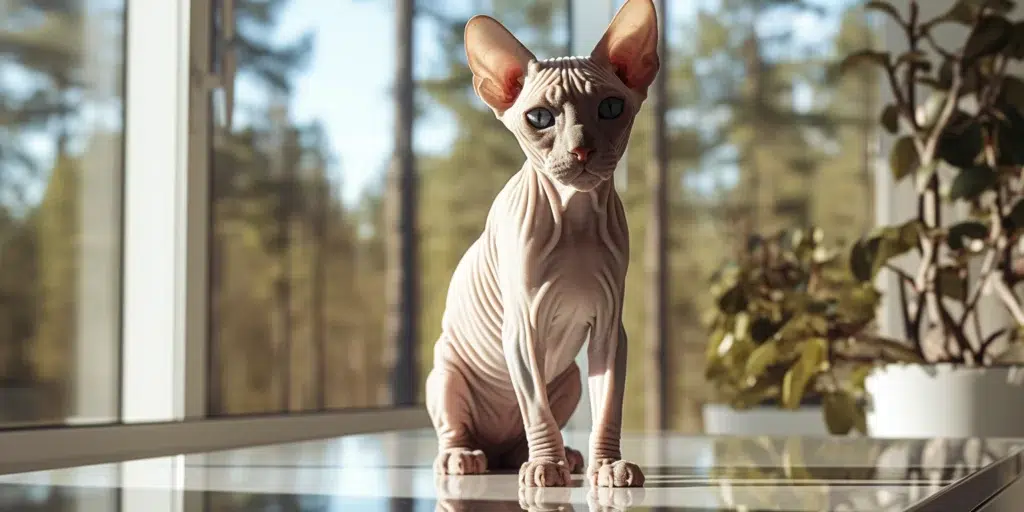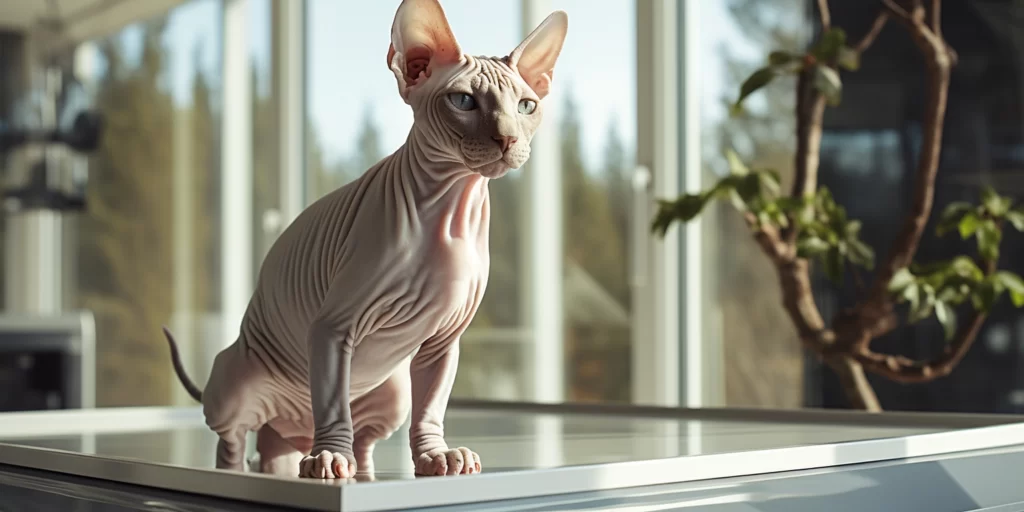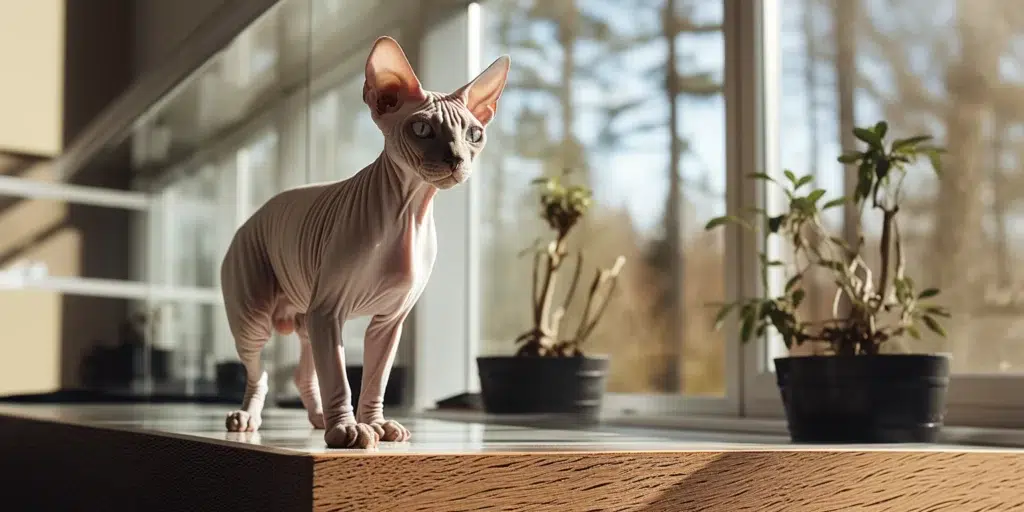Welcome to our fascinating journey into the world of Sphynx cats and their vocal habits! If you’ve ever wondered whether these unique, hairless beauties are chatty creatures, you’re in the right place.
Sphynx cats are known for their distinct appearance, but their personalities are just as captivating, especially when it comes to the sounds they make.
In this blog, we’ll dive deep into the world of Sphynx cat noises, exploring everything from their most common vocalizations to what they might be trying to communicate with them.
They are indeed talkative, engaging in conversations with their human companions more often than some other breeds. Their vocalizations can vary widely, from soft purrs to loud meows, making them an incredibly expressive breed.
By the end of this blog, you’ll have a deeper appreciation for their vocal expressions and a better understanding of how to interpret them. Let’s embark on this auditory adventure together and learn all about the chatty world of Sphynx cats.

Are Sphynx Cats Vocal Cats?
Yes, very much! Sphynx cats are indeed among the more vocal cat breeds out there. They use their voice to communicate with their human companions, expressing desires, emotions, and even discontents in a variety of sounds that can be both entertaining and puzzling.
The gender of the cat can sometimes play a role in how vocal they are, but it’s not a strict rule. Male and female Sphynx cats can be equally talkative, depending on their personality.
Just like people, some individual cats might naturally be more communicative than others. It’s essential to consider each Sphynx cat as an individual with its unique voice and personality.
Factors That Influence Sphynx Cat Noise Levels
Another interesting aspect is their activity and exercise level. While it might seem counterintuitive, more active Sphynx cats can sometimes be less noisy. This is because they channel their energy into physical activities.
However, if they’re bored or crave attention, they might start to vocalize more, making noises to catch your eye (or ear!). Understanding this balance is key to keeping both you and your Sphynx happy.
Their Age
Age is a significant factor affecting how vocal Sphynx cats might be. Kittens are generally more talkative as they explore their surroundings, calling out when they’re hungry or seeking attention. As they grow, their communication might become more refined, but they usually maintain their talkative nature.
Adolescent cats may go through a “teen” phase, where their vocalizations can become more demanding. This is partly because they are testing boundaries and learning to communicate more effectively with their humans. Understanding this phase is important for adjusting how you interact with them.
As Sphynx cats become seniors, they might become less vocal, or their meows might reflect different needs, such as comfort or help navigating their environment due to age-related changes. Observing these shifts in vocalization can give insights into their health and well-being.
Feeding Sphynx Cats and Its Relation to Noise Levels
Mealtime is a prime time for Sphynx cats to get vocal. They quickly learn to meow or make noise to signal that they’re hungry or to hurry you along if you’re not moving fast enough for their liking. This communication around feeding can become a routine, with their calls reminding you of their meal schedules.
However, it’s also possible to use feeding time as a way to regulate their vocalizations. By establishing consistent feeding times, Sphynx cats can learn when to expect food, which might reduce excessive meowing for meals. It’s a balance between responding to their needs and not encouraging constant vocal demands for food.
Sometimes, a Sphynx cat’s increased vocalization can indicate they’re not getting enough to eat or are experiencing digestive issues. Monitoring their health and ensuring they have a balanced diet is crucial to keep their noise levels from signaling something more serious than hunger.

Sphynx Cat Exercise Level Affects Their Noise Levels
Exercise plays a crucial role in the well-being of Sphynx cats, influencing not only their physical health but their vocalizations too. A well-exercised Sphynx is generally a quieter cat because they’ve spent their energy running, jumping, and playing.
Integrating playtime into their daily routine can significantly affect their noise levels. Engaging in activities that stimulate their hunting instincts, like chasing laser pointers or feather toys, can fulfill their need for interaction and reduce their vocal demands for attention.
On the flip side, a lack of exercise can lead to boredom and stress, manifesting in more frequent or louder vocalizations. Thus, keeping your Sphynx active is beneficial for both their physical health and managing their vocal habits.
Medical Conditions
Sometimes, an increase in vocalization can indicate health issues. If your Sphynx cat starts meowing more than usual or in a strained tone, it might be time to visit the vet. Pain, discomfort, or other medical conditions can cause them to vocalize their distress.
Regular check-ups are crucial for early detection of health issues. Being attentive to changes in their noise levels can sometimes be the first clue to underlying problems, reinforcing how important it is to understand their normal vocal patterns.
Cognitive changes in older Sphynx cats, such as confusion or disorientation, can also lead to increased vocalizations. Awareness and early intervention can make a significant difference in managing these conditions and maintaining their quality of life.

Sphynx Cat Noises and Their Meaning
Understanding the different noises your Sphynx cat makes is not only fascinating but can also help you respond better to their needs, strengthening your bond.
Each sound carries its own message, and learning to interpret them can be an enjoyable aspect of living with a Sphynx.
Meow (The Most Common Noise)
The “meow” is probably the most recognizable cat sound and can vary significantly among Sphynx cats. It can be a greeting, a demand, or a sign of excitement. The tone, length, and frequency of the meow can help you decipher what your Sphynx might be trying to communicate.
A short, soft meow might be a simple hello, while a series of louder meows could indicate hunger or the desire for attention.
Paying attention to these subtleties can enhance your communication with your furry friend, making it easier to meet their needs and desires.
Purring (The Most Enjoyable Cat Noise)
Purring is often associated with contentment and happiness. If your Sphynx cat purrs while curled up in your lap, it’s a clear sign they’re enjoying the moment. However, it’s also important to note that cats can purr when feeling anxious or unwell as a self-soothing mechanism.
Observing the context in which your Sphynx purrs can provide insights into their emotional state. A purring cat in a relaxed body posture usually means happiness, while purring in a tense or unusual situation may require closer attention to their well-being.
Hissing (Your Cat Feels In Danger)
Hissing is a defensive noise, signaling fear, discomfort, or territoriality. If you hear your Sphynx hissing, it’s essential to identify the cause of their distress and address it. Ensuring they feel safe and respected in their environment can help reduce the occurrence of hissing.
Yowl (Not a Happy Meow)
The yowl is a longer, more drawn-out sound that can express discomfort, loneliness, or frustration. It’s a sound that calls for your attention, indicating that your Sphynx may need something more than the usual care.

Growls (Not as Scary as a Tiger)
Growling can be a sign of annoyance, fear, or warning. It’s wise to approach with caution if you hear your Sphynx growling, giving them space to calm down.
Understanding what triggers this response can help you prevent potential stressors in their environment.
Some Cats are More Talkative Than Others
Personality plays a significant role in how vocal a Sphynx cat is. While the breed is known for being chatty, individual differences exist.
Some Sphynx cats might hold lengthy conversations with their humans, while others might be more reserved with their vocal expressions.
How to Make Sphynx Cats Less Vocal?
If your Sphynx’s vocalizations become overwhelming, consider if their basic needs are being met. Ensure they have enough food, water, entertainment, and affection. Sometimes, simply spending more quality time with them can reduce their need to vocalize for attention.
Creating a stimulating environment with toys and activities can also help manage their vocal habits. And remember, patience and understanding are key. Learning to communicate effectively with your Sphynx takes time but is incredibly rewarding.

Conclusion
Sphynx cats are undeniably vocal, using their voices to communicate a wide range of emotions and needs. Understanding their noises can deepen the bond between you and your unique pet, making your shared life richer and more harmonious.
By paying attention to the nuances of their vocalizations and considering the factors that influence their noise levels, you can create a happy and fulfilling environment for your talkative Sphynx cat.